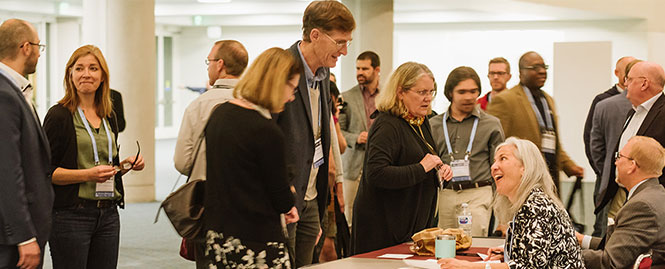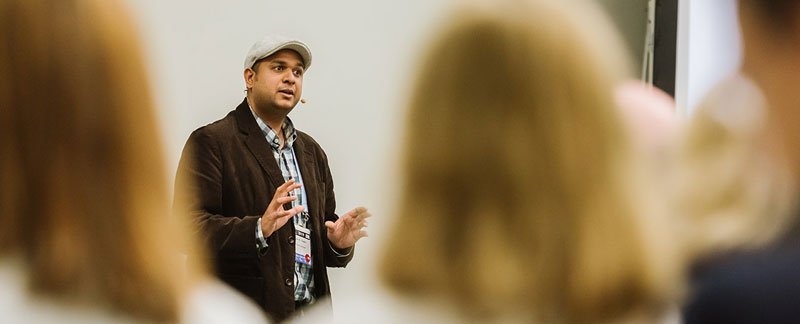Friday, November 21
3:30 - 5:30 PM
Location: TBA
Presentations
Marion A. Taylor, Wycliffe College, Moderator
Athanasius’ Theological Interpretation of Displacement Events in Scripture: Applying Scripture to Memory Accounts of Himself and Others in De fuga and Ad Constantium
Jonatán Simons, Fundación Universitaria Seminario Bíblico de Colombia
The Not-So-New Perspective on Paul: Neglected Medieval Conceptions of Works of Law and Justification
Thomas Dixon, Campbell University
The Reception of Mary Magdalene in the History of Interpretation
Jennifer Powell McNutt, Wheaton College
The Apostle Paul before the Tribunal: Legal Institutions in Acts 22–26 as Interpreted for Early Modern Europe
Mark Elliott, Professor of Biblical and Historical Theology/ Highland Theological College & Professorial Fellow, Wycliffe, Toronto
Wisdom Literature’s Enlightenment Interpreters
Arthur Keefer, University of Divinity
Sat Nov 23
9:00 - 11:30 AM
Indigo 204A (Second Level) - Hilton Bayfront
The History of Biblical Interpretation research group focuses on recovering and examining the work of past male and female biblical interpreters with the aim of better understanding the methodologies, themes, and historical trajectories in the interpretation of biblical texts. This year, our theme is “Reading the ‘Cursing’ Psalms with our Interpretive Foremothers and Forefathers.” The so-called imprecatory or cursing psalms are often a stumbling block for many readers of the Psalms. Our call for papers invites us to consider how these psalms have been read by forgotten and known foremothers and forefathers throughout the history of interpretation, and what their responses can teach us about how we read these challenging psalms today. Inquiries about the session can be directed to Marion Taylor ([email protected]) or Andy Witt ([email protected]).
Marion Taylor, Wycliffe College, Presiding (5 min)
Wm. Taylor Tollison, University of Aberdeen
Bonhoeffer and the Imprecatory Psalms: Praying Psalm 58:6–11 for Our Enemies (20 min)
Jimmy Chan, University of Toronto
Dashing Little Ones of Babylon against the Rock? Augustine’s Christological-Ecclesial Interpretation of the Horrifying Verses of Psalm 137:8–9 (20 min)
Jen Gilbertson, Tyndale University
When Do Women Curse? Exploring Women’s Interpretation (or Avoidance) of the Imprecatory Psalms (20 min)
Andrew Witt, Tyndale University
Metaphrasing Imprecation in the Sidney Psalter and Other Sixteenth-Century Metrical Psalters (20 min)
Nate Wall-Bowering, Providence Theological Seminary
Befriending Enmity: John Donne’s Ambivalent Relationship to the Imprecatory Psalms (20 min)
Discussion (15 min)
1:00 to 3:00 pm
11/17/2023
Conference Room 1
The History of Biblical Interpretation group focuses on recovering and examining the work of past male and female biblical interpreters with the aim of better understanding the methodologies, themes, and historical trajectories in the interpretation of biblical texts. This year our panel of experts will share their varied experiences of moving away from the traditional “great books” approach to scholarship and teaching to include forgotten or little-known historic and contemporary voices. Each presenter will provide sample syllabi from their biblical courses talk about the practicalities of bringing this recovery and research into the classroom. Taylor will speak about including more historical voices in biblical courses; Stephen Chester will share his experience of reworking a traditional Introduction to New Testament course and his course on Paul's Gospel from Reformation to New Perspective to include diverse voices; Andrew Witt will speak about incorporating women and non-western voices into the teaching the Book of Psalms; Bo Lim will speak about diversifying one's syllabus for the sake of theological and contextual interpretation, focusing on methodology; Grant LeMarquand will speak about incorporating non-western biblical material into his courses; Max Lee will share the story of how his Intercultural “Readings of the Bible” course came into being; Rachel Wilkowski will speak about including children's Bibles in your syllabus, offering a case study on depictions of Eve in Protestant children's Bibles in the 1920s and 2010s. For more information, contact Marion Taylor ([email protected]) and Andy Witt ([email protected]).
Andrew Witt, Tyndale University, Presiding (5 min)
Marion Taylor, Wycliffe College
Including Silenced and Forgotten Women’s Voices (10 min)
Stephen Chester, Wycliffe College
Revamping Traditional New Testament Courses (10 min)
Andrew Witt, Tyndale University
Including Forgotten Women and Non-Western Voices When Teaching Psalms (10 min)
Bo H. Lim, Seattle Pacific University
Diversifying Syllabi for the Sake of Theological and Contextual Interpretation (15 min)
Break (5 min)
Grant LeMarquand, Trinity School for Ministry
Reading the New Testament with Non-Western Voices (15 min)
Max Lee, North Park University
Developing an "Intercultural Readings of the Bible" Course (15 min)
Rachel K. Wilkowski, Trinity College Dublin
Including Children's Bibles in a Syllabus: A Case Study of Eve in Protestant Children's Bibles in the 1920s and 2010s (15 min)
Discussion (20 min)
History of Biblical Interpretation
3:30 PM to 5:30 PM
11/19/2022
Plaza Court 5 (Plaza Tower - Concourse Level) - Sheraton Downtown (SD)
The History of Biblical Interpretation group focuses on recovering and examining the work of past male and female biblical interpreters with the aim of better understanding the methodologies, themes, and historical trajectories in the interpretation of biblical texts. This year, our theme is “Reading Paul in the Reformation.” We have invited three experts to give 20-minute presentations on male and female interpreters during the Reformation which will provide fodder for a robust time of discussion to follow. Inquiries about the session can be directed to Marion Taylor ([email protected]) or Andrew Witt ([email protected]), or visit the IBR website under the Research Groups tab (https://www.ibr-bbr.org/ )
Andrew Witt, Tyndale University College and Seminary (Ontario), Welcome (5 min)
Stephen J. Chester, Wycliffe College
Reading Paul with the Reformers (20 min)
Discussion (5 min)
Joy Schroeder, Capital University
Not Women’s Chit Chat but the Word of God: Women of the Reformation Reading Paul (20 min)
Discussion (5 min)
Marion Ann Taylor, Wycliffe College
“Should Women Speak/Preach?” Marie Dentière, Calvin, and Farel (20 min)
Discussion (5 min)
Roundtable Discussion (40 min)
Postponed until 2022.
[ibr_research_group year="2020"]
This year, our session will focus on the Bible in the Public Square. To facilitate our discussion, we invited paper submissions that explore how the Bible was used historically in debates about slavery, gender ideology, immigration, abortion, the relationship between Christians and government authorities, justification for war, etc. Presenters will give a 20-minute presentation followed by 10 minutes of discussion.
- Amanda Benckhuysen, Calvin Theological Seminary, Presiding
- M. Daniel Carroll R., Wheaton College (Illinois)
Reading the Bible with a Migration Lens: New and Needful (20 min)
Discussion (10 min)
- Laceye C. Warner, Duke University Divinity School
Reading Scripture with the Grimké Sisters: Hermeneutic of Redemption (20 min)
Discussion (10 min)
- Andrew Judd, Ridley Melbourne
Hagar, Uncle Tom’s Cabin, and why we can’t agree on what the Bible means (20 min)
Discussion (10 min)
- Kathleen Buligan, University of Toronto
The Book of Esther and the Temperance Movement (20 min)
- Break (10 min)
Theme: The Art of Sleuthing - Recovering Past Interpreters and Their Work. In this session, four senior scholars will talk about their journey in exploring the history of biblical interpretation, touching on such topics as the importance, significance, and payoff of studying the history of biblical interpretation, how to go about doing this kind of research, best practices and resources, and their experience publishing in this area.
-
Amanda Benckhuysen, Calvin Theological Seminary, Presiding
-
Amanda Benckhuysen, Calvin Theological Seminary, Introduction (5 min)
-
Stanley Porter, McMaster Divinity College
Reflections from the Co-Editor of “Pillars in the History of Biblical Interpretation,” Vols 1 and 2 (20 min)
Discussion (5 min)
-
Joy Schroeder, Trinity Lutheran Seminary and Capitol University
Reflections from the Translator and Editor of “The Bible in the Medieval Tradition” and Author of “Deborah’s Daughters” (20 min)
Discussion (5 min)
-
Emerson Powery, Messiah College
Reflections from the Co-Author of “The Genesis Liberation: Biblical Interpretation in the Antebellum Narratives of the Enslaved” (20 min)
Discussion (5 min)
-
Marion Ann Taylor, Wycliffe College
Reflections from the Editor of “Handbook of Women Biblical Interpreters,” and Co-Editor of “Women of War, Women of Woe” and “Women in the Story of Jesus” (20 min)
Discussion (5 min)
-
General Discussion
-
Discussion (10 min)
-
Business Meeting (5 min)
2017 Focus: Reading with the Reformers: Special Session commemorating the 500th anniversary of the Protestant Reformation.
-
Marion Taylor, Wycliffe College, Presiding
-
Amanda Benckhuysen, Calvin Theological Seminary, Introduction (5 min)
-
John L. Thompson, Fuller Theological Seminary (Pasadena)
A Matter of Gratitude: Calvin on Reading the Fathers (20 min)
Discussion (5 min)
-
Mark Gignilliat, Beeson Divinity School at Samford University
Luther and Calvin with Jacob at the Jabbok (20 min)
Discussion (5 min)
-
Rebekah A. Eklund, Loyola University Maryland
Blessed Are the Excommunicated: Reading the Beatitudes with the Reformers (20 min)
Discussion (5 min)
-
Amanda Benckhuysen, Calvin Theological Seminary
“I send you not a woman’s ranting, but the Word of God”: The Life and Work of Female Reformers (20 min)
Discussion (15 min)
-
Business Meeting (5 min)
Nov. 17, 3:30–5:30pm Tufts (Third Level) – Boston Marriott Copley Place (MCP)


